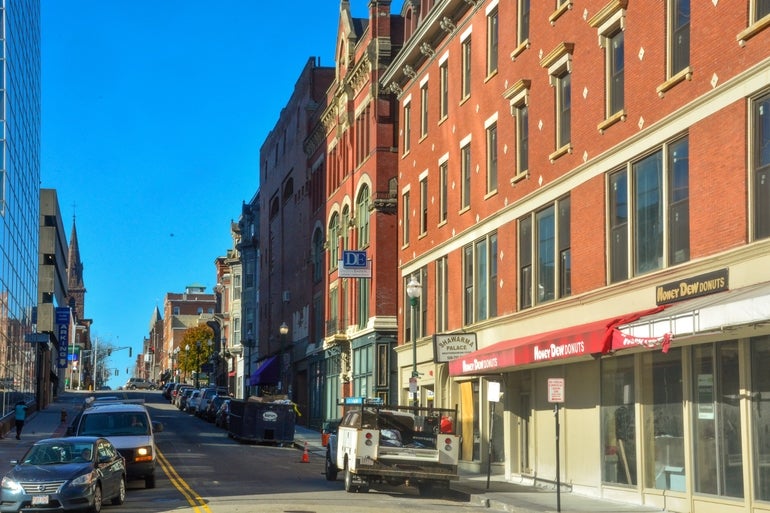In December 2019, no one could have predicted what was to come in 2020. Still, the major trends and news items for the year largely stayed on track. Of the 10 predictions made by the WBJ Editorial Staff for the year, seven came true.
Get Instant Access to This Article
Subscribe to Worcester Business Journal and get immediate access to all of our subscriber-only content and much more.
- Critical Central Massachusetts business news updated daily.
- Immediate access to all subscriber-only content on our website.
- Bi-weekly print or digital editions of our award-winning publication.
- Special bonus issues like the WBJ Book of Lists.
- Exclusive ticket prize draws for our in-person events.
Click here to purchase a paywall bypass link for this article.
In December 2019, no one could have predicted what was to come in 2020. Still, the major trends and news items for the year largely stayed on track. Of the 10 predictions made by the WBJ Editorial Staff for the year, seven came true.
The logjam waiting for Massachusetts Cannabis Control Commission approvals will break.
Although more marijuana businesses received licenses in 2020, the long wait times and significant backlog of companies waiting for approval to open remains. For example, Uxbridge microbusiness Yamna waited more than a year for its license, even though it was supposed to receive an expedited approval process.
Expect some white knuckles with the Polar Park construction timetable, although it will open in 2021 as planned.
The seven-week shutdown caused by the coronavirus pandemic in the spring didn’t help matters, but the $132-million public baseball stadium remains on target to open in April, as the city and Worcester Red Sox agreed to bring on extra construction labor.
A lack of demand to fly in and out of Worcester Regional Airport hampers flight growth.
This wasn’t quite what we predicted, but flight demand worldwide fell off the shelf because of the coronavirus pandemic. As a result, the number of regularly scheduled commercial flights out of Worcester dropped from five to zero.
The Worcester Regional Transit Authority will move to become a fare-free system.
Although the WRTA is still talking about making the change to a fare-free system, as the trend is increasingly discussed nationwide, the authority has yet to take any tangible steps to eliminate fares.
Central Massachusetts home prices will continue to climb, led by MetroWest.
First, home prices spiked due to limited supply in the early phases of the coronavirus pandemic. Then, as cases dropped over the summer, more supply hit the housing market, but it wasn’t enough to satiate demand. As of November, single-family home prices are up 12% year-to-date in Central Massachusetts.
Office vacancy rates will be an issue in Worcester, Westborough, Fitchburg, Marlborough, Natick & Shrewsbury.
And they’ll be a bigger issue next year, too. With more companies realizing the financial benefits of work-from-home policies, vacancy rates will increase further, after companies like insurer Unum decided to close its Worcester offices to keep employees remote, and more than 100,000 square feet of sublease became available in Natick and Framingham as five companies looked to vacate their offices.
Generous government incentives will be needed to fill The Reactory.
The first tenant on the Worcester biomanufacturing campus, Chinese life sciences company WuXi Biologics, received $17.5 million in state and city incentives to build its $60-million facility at The Reactory. The developer for the rest of the campus, Galaxy Life Sciences of Webster, has yet to announce its tenants, but based on other major deals in Worcester, incentives are likely for those companies, too.
More hotels will be announced and built in Worcester.
Of all the industries hit hard by the coronavirus pandemic, the hospitality industry might have been the worst. Although hotels fared better than restaurants, no new hotels were announced for Worcester, and the two slated for the Polar Park development were cut to one.
Central Massachusetts will still have 17 colleges and universities in 2021.
A year ago, with the number of high school graduates dropping, colleges with tenuous financials were seen vulnerable to the trend that ended up closing a handful of schools, such as Mount Ida College in Newton. The pandemic only made things worse, but all the Central Massachusetts colleges are still standing.
The MassHealth nursing home funding initiative will be resolved before it heads to the November ballot.
This turned out to be mostly true. The initiative to increase state government reimbursement amounts for nursing homes never made it to the ballot, although it wasn’t resolved by a compromise in the Legislature. Instead, the initiative’s backers did not file in time for the deadline to make it on the ballot.

